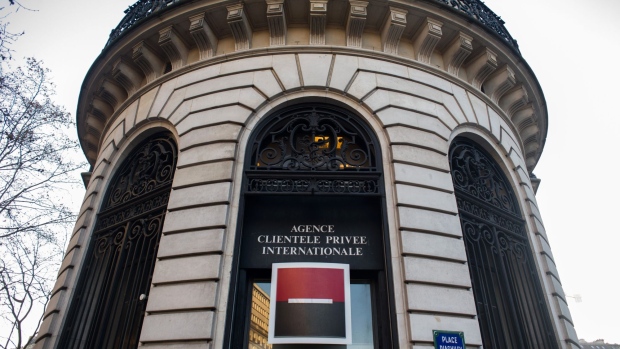Feb 8, 2023
SocGen Misses Own Payout Pledge in CEO Oudea’s Final Year
, Bloomberg News

(Bloomberg) -- Societe Generale SA fell short of a pledge to pay out half of its underlying profit to shareholders, even after its fixed-income traders handed Chief Executive Officer Frederic Oudea a bigger-than-expected profit.
Revenue from buying and selling fixed-income products and currencies jumped 56% in the fourth quarter, beating analysts estimates as well as all main rivals so far. That and a strong showing in financing and advisory made up for a lackluster performance in equities and in the French retail business.
But after suffering a multibillion-euro hit when it exited Russia last year, the Paris-based firm decided to hold onto a bigger portion of earnings to strengthen capital, returning about €1.8 billion through dividends and buybacks. That’s about a third of underlying profit.
The decision comes at a time when rivals are racing to reward investors as they emerge from years of negative interest rates and subpar profitability. BNP Paribas SA on Tuesday announced it will return €5 billion through buybacks as it hands out excess cash from the sale of its US unit. For Oudea, who’s been putting the finishing touches on his legacy before he is scheduled to pass the baton to investment bank head Slawomir Krupa in May, it caps another tumultuous year.
The year “marked a decisive stage for the group” as it adapted to “an uncertain and complex environment,” Oudea said in a statement. SocGen, he said, “is embarking with determination on 2023, a year of transition in many respects.”
SocGen shares fell 0.2% at 9:01 a.m. in Paris trading. The stock has trailed BNP as well as an index of European banks over the past 12 months.
Revenue from fixed income trading, traditionally a smaller business for the firm than equities, jumped 56% from a year earlier. That’s better than the average 28% gain posted by the biggest Wall Street firms and the 45% increase at BNP. Equities trailed slightly, down 12%.
SocGen’s financing and advisory unit weathered the slump in dealmaking that hit many peers. The business, which includes transaction banking, posted a 17% gain in revenue.
“Societe Generale reported a good set of results,” KBW analysts led by Tom Hallett said in a note. However, “the underwhelming nature of share repurchases and lack of forward guidance take some shine away.”
The lender proposed a cash dividend of €1.70 a share to be paid on last year’s results, along with a €440 million share buyback. Had it paid out half of the €5.62 billion in underlying profit for the year, that would have been more than the reported net income for the year.
Such a move could have been difficult to explain to regulators at the European Central Bank, who have urged banks to be prudent when deciding on shareholder payouts, given the many risks to the economy. SocGen set aside €413 million for souring loans in the fourth quarter, less than analysts had expected but still almost five times as much as a year ago.
A spokesperson for the firm said the payout decision reflects a desire to balance shareholder rewards and balance sheet strength. A key measure of capital, known as the CET1 ratio, came in higher than analysts had expected at 13.3% when assuming full implementation of stricter regulatory standards. SocGen plans to return to its regular payout policy in the coming years, the person added.
Chairman Lorenzo Bini Smaghi, who oversees the board of directors that decides on payout proposals, was among the most vocal critics of the ECB’s de facto dividend ban during the Covid-19 pandemic. Led by the former ECB policy maker, the board even proposed a payout in 2021 after the lender suffered its first losing year in decades. In October, he wrote to the central bank protesting officials’ requests to be present in bank board meetings, Bloomberg has reported.
Oudea, the longest-serving CEO of a major lender in the European Union, restructured the equities business after the pandemic losses, allowing the firm to rebound with a record profit the following year. Russia’s invasion of Ukraine last year threw up yet another challenge, prompting an exit from the country that resulted in a €3.3 billion hit to profit before taxes.
To strengthen the bank, Oudea merged the French retail networks. But local laws that cap how much lenders are allowed to raise mortgage rates have made it difficult for French lenders to profit from higher interest rates as quickly as peers in other countries. Revenue at the domestic retail business fell slightly from a year earlier, with SocGen predicting further declines this year.
(Adds shares in sixth paragraph, analysts’ comment in ninth.)
©2023 Bloomberg L.P.





